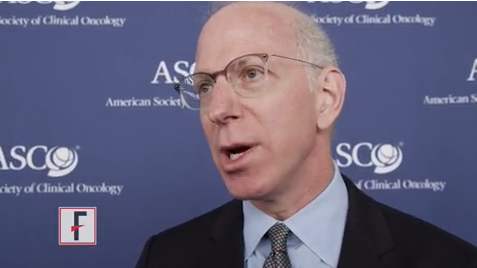User login
CHICAGO – Adding docetaxel chemotherapy to standard management improved survival in men with high-risk, localized, hormone-sensitive prostate cancer, results from the phase III RTOG 0521 study show.
At 4 years, overall survival was 89% without docetaxel and 93% with the addition of docetaxel (Toxotere) and prednisone after completing radiotherapy and long-term hormonal suppression (Hazard ratio, 0.70; P = .04).
“For the first time, improvement in overall survival was observed with adjuvant chemotherapy for localized, high-risk, hormone-sensitive prostate cancer,” Dr. Howard Sandler said in a press conference in advance of the formal presentation of the late-breaking study at the annual meeting of the American Society of Clinical Oncology.
The implications of the study are clinically relevant and wide-ranging, particularly in patients with high-risk disease, press briefing moderator Dr. Don Dizon, commented.
Dr. Sandler, chair of radiation oncology at Cedars-Sinai Medical Center, Los Angeles, gives details of this practice-changing study in a video interview.
The study was funded by the National Institutes of Health. Dr. Sandler reported financial relationships with several firms including Sanofi Aventis, maker of docetaxel.
The video associated with this article is no longer available on this site. Please view all of our videos on the MDedge YouTube channel
On Twitter @pwendl
CHICAGO – Adding docetaxel chemotherapy to standard management improved survival in men with high-risk, localized, hormone-sensitive prostate cancer, results from the phase III RTOG 0521 study show.
At 4 years, overall survival was 89% without docetaxel and 93% with the addition of docetaxel (Toxotere) and prednisone after completing radiotherapy and long-term hormonal suppression (Hazard ratio, 0.70; P = .04).
“For the first time, improvement in overall survival was observed with adjuvant chemotherapy for localized, high-risk, hormone-sensitive prostate cancer,” Dr. Howard Sandler said in a press conference in advance of the formal presentation of the late-breaking study at the annual meeting of the American Society of Clinical Oncology.
The implications of the study are clinically relevant and wide-ranging, particularly in patients with high-risk disease, press briefing moderator Dr. Don Dizon, commented.
Dr. Sandler, chair of radiation oncology at Cedars-Sinai Medical Center, Los Angeles, gives details of this practice-changing study in a video interview.
The study was funded by the National Institutes of Health. Dr. Sandler reported financial relationships with several firms including Sanofi Aventis, maker of docetaxel.
The video associated with this article is no longer available on this site. Please view all of our videos on the MDedge YouTube channel
On Twitter @pwendl
CHICAGO – Adding docetaxel chemotherapy to standard management improved survival in men with high-risk, localized, hormone-sensitive prostate cancer, results from the phase III RTOG 0521 study show.
At 4 years, overall survival was 89% without docetaxel and 93% with the addition of docetaxel (Toxotere) and prednisone after completing radiotherapy and long-term hormonal suppression (Hazard ratio, 0.70; P = .04).
“For the first time, improvement in overall survival was observed with adjuvant chemotherapy for localized, high-risk, hormone-sensitive prostate cancer,” Dr. Howard Sandler said in a press conference in advance of the formal presentation of the late-breaking study at the annual meeting of the American Society of Clinical Oncology.
The implications of the study are clinically relevant and wide-ranging, particularly in patients with high-risk disease, press briefing moderator Dr. Don Dizon, commented.
Dr. Sandler, chair of radiation oncology at Cedars-Sinai Medical Center, Los Angeles, gives details of this practice-changing study in a video interview.
The study was funded by the National Institutes of Health. Dr. Sandler reported financial relationships with several firms including Sanofi Aventis, maker of docetaxel.
The video associated with this article is no longer available on this site. Please view all of our videos on the MDedge YouTube channel
On Twitter @pwendl
AT THE ASCO ANNUAL MEETING 2015
